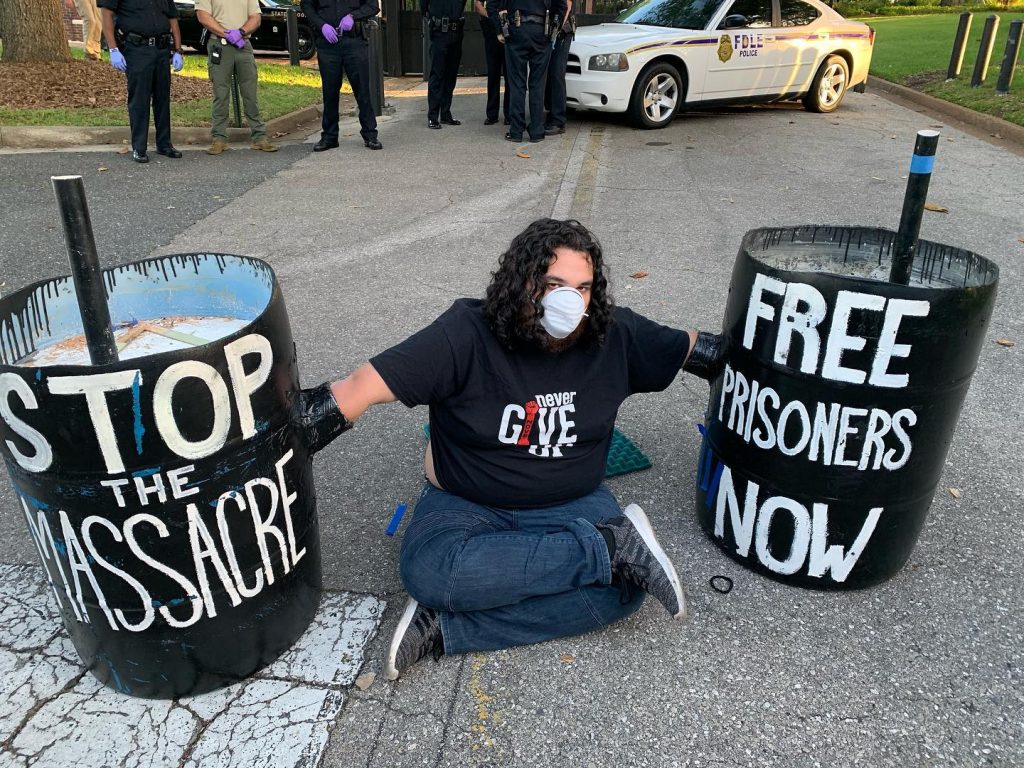The prison industrial complex is a well oiled machine, deep rooted in American society and its economics. There is much ground work and strategy needed to break that system and eventually shut it down. Countless grassroots organizations fight to end mass incarceration and abolish prisons. Even during a global pandemic, they continue fighting to keep prisoners safe and alive. There has been tremendous pressure to release prisoners, which the Bureau of Prisons and some states did, but not nearly enough. One state, Alabama, refused to release prisoners and decided to build new places to confine them. Governor Ivey, the Alabama Department of Corrections and CoreCivic (formerly Corrections Corporation of America) proposed building three mega prisons, housing 4000 prisoners each at a cost of 3.4 billion dollars. This decision was made even with Alabama being among the top 10 poorest states and its Department of Corrections under investigation and facing a lawsuit from the Department of Justice.
Several grassroots organizations formed a coalition that strategized to shut down their plan by working with local organizers, then targeting banks and the treasury Department. Movement Talks spoke with Jordan Mazurek, activist and organizer with Fight Toxic Prisons and Prison and Jail Closing Coordinator for National Council for Incarcerated and Formerly Incarcerated Women and Girls. Jordan discussed three strategies to stop prison construction that engaged unlikely coalitional partners such as conservative rural Alabama organizers, targeting banks that had agreed to sponsor the prison project and to obtain policy from the National Treasury Department not to use COVID funds for jails.
First, after forming a coalition with Community Not Prisons, these organizations engaged conservative rural Alabama organizers. The Alabama organizers were fighting against opening prisons in their backyard, while the coalition’s organizers didn’t want more black/brown people filling those prisons. They found common ground to work together.

Jordan explained “ Those communities said we will fight with you if you fight with us.
We’re all coming from very different backgrounds why we’re fighting this thing; very different political sphere; rural Alabama extremely Pro Trump supporting.”
Jordan further explained “Through the ability to build that coalition, as well as reach out to different National Partners, we were able to defeat the financing for the prison itself.”
The second strategy was to target banks that were sponsoring the project, Barclays, Key Bank and Stifel. In order to go up against these global banks, the organizers built a network of Impact investors. The strategy of impact investing is to use money to generate wealth that creates a positive social or environmental impact. The banks dropped out after facing pressure from the coalition and the impact investors who targeted them. The banks acknowledged the community’s concerns and issues. Also, threats to their bottom line and reputation was a factor as Basso, a hedge fund client of Stifel Bank, halted business with them, stating that “As a long-standing trading client of Stifel, we are halting our business with them as long as their policy to finance mass incarceration stands, and we urge other Stifel clients and partners to do the same.”
Speaking on the success of this strategy Jordan said, “We were able to get a network of Impact investors on board, folks we never would have normally talked to but investors that wanted to see money going in the project that could actually build community up instead of projects like these prisons that would destroy them.”
“Through that multiple 1-2-3-4 punch from the grassroots within the communities where the prisons were going to be built, to national partners with investors that said, ‘Hey you banks if you try to build these things we’re out,’” Jordan continues. “Now by combining all that pressure, we were able to kill the first iteration of this project. Barclays backed out, Stifel backed out, Key Bank backed out after the bond already came to market, so that’s never been done.”
The last strategy was getting the National Treasury Department to declare that using covid relief funds to build prisons and jails is illegitimate, which affected attempts across the country to use funds for the same purpose. Governor Ivey of Alabama is now claiming a loophole and has made plans to build 2 different mega prisons.
To that Jordan says, “We’re going to fight that in court. See you there. But, we’re not going to stop fighting. Push comes to shove, we’ll find another way to shut these things down.”
Listen to Jordan’s entire interview.
Our Community Based News Room publishes the stories of people impacted by law and policy. Do you have a story to tell? Please contact us at CBNR. To support our Community Based News Room, please donate here.




